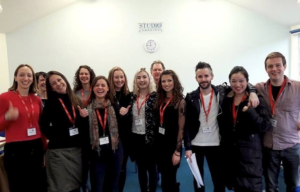CELTA course questions and answers
Hi! I’m Gabriel and I’ve been working here at Studio Cambridge for more than ten years now as an English teacher and also as a teacher trainer on CELTA courses. The school asked me to look at five questions about the CELTA course that people have asked and you’ll see my answers below – one thing I’d say is that when I answered these questions it made me realise how much I enjoy being a CELTA tutor and how lucky I am to work with so many different people – though I suppose that’s like any EFL job really…

Do you need a CELTA qualification to work as an English teacher?
You might expect the answer to this question to be ‘yes’. Actually, CELTA is just a ‘brand name’ for a particular type of ‘TEFL’ certificate. TEFL is the acronym (Teaching English as a Foreign Language) that just describes the whole industry/area of English teaching. There are other ‘TEFL’ certificates offered by other institutions and organisations. However, a CELTA is a bit like getting a degree from Cambridge University – it’s the best one! Also, importantly many employers request CELTA specifically and it is recognised by employers as really the gold standard in the world of English teaching – and by employers offering high-quality teaching jobs especially. So, if you have a CELTA you can be confident that this will cover any job-hunting situation, and you can be confident that you’ll have a better chance with some of the really good TEFL jobs. Our trainees have gone on to work all over the world as well as in the UK (and in some cases for our school itself)!
Is a CELTA course only for new teachers?
No! Many people who do a CELTA course do have teaching experience but want to develop their skills further. This is true of many of our trainees. On our last course for example half of the group had at least some background in teaching, both in the UK and in other countries. Did they benefit from doing the course? Of course! In fact, typically trainees who’ve had some experience sign up for a course because they know that there’s something missing in their own practice or school and they want to take things to the next level, really focusing on what they can do to improve or even changing their whole approach. A great part of my job is that I can work with people with all kinds of experience and none – I know that they will go away from the course feeling that they’ve really got a lot out of it.

Is CELTA difficult?
It depends by what you mean by ‘difficult’. A word that many trainees use after the course is ‘challenging’! There’s no doubt that the course is intense – there’s a lot to cover in a relatively short time and you have to take in a lot of new information. You’re also under pressure to perform in a new environment. But this is totally normal. Teaching is not a passive job – you need to just jump in and go for it. If you ask teachers to look back on their CELTA they will often smile and mention that word ‘challenging’… but then straight away start using words like ‘rewarding’. Of course, it’s my job to give all the support necessary, to help people take on that challenge and deal with it. And actually I love that – I love seeing people rise to it, improve and look back and feel proud of themselves!
Do you have to be an extrovert to do a CELTA and be an English teacher?
For me, this is a really interesting question! Many people think that the answer to this must be ‘yes’. But in fact in my experience teachers come in all varieties. Just like students, teachers have their own personalities and … that’s OK! Of course communication and interpersonal skills are important in this job, but some of the best teachers I know can actually be quite reserved in ‘real life’. Also, of course, because students are different, they will respond to different types of teacher. As long as the teacher is confident in what they’re doing and motivated to help students as much as they can then students will benefit. You don’t need to fake being another person. You can and will have your own teacher personality or ‘voice’. So, yes, another a reason I love my job as a CELTA tutor is I get to see all kinds of teachers find that voice and I love seeing how different personalities can shine.
Do you need to have English as your first language?
No, definitely not. You need to have very good English of course, but many of our trainees are non-first-language English speakers. Our most recent courses included trainees from Argentina, Germany, China and Russia for example. You guessed it – a great part of my job is working with trainees from all over the world and with different language and educational backgrounds. I also see how trainees on a course can learn so much from each other in those situations!









